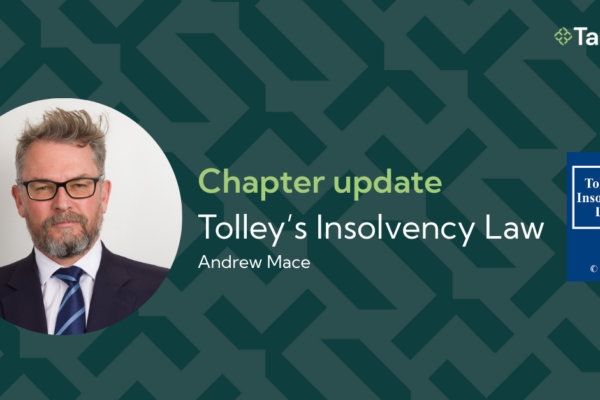Andrew Mace has updated the chapter on Construction and Engineering Insolvency in
Nora Wannagat succeeds in three day High Court trial of rectification claim

On 26 February 2025, judgment was handed down in Bhatia v Purkiss [2025] EWHC 359 (Ch). Nora acted as sole counsel for the liquidator of JD Group Ltd. A link to the judgment can be found here.
In 2022, a judgment (Re JD Group Ltd [2022] EWHC 202 (Ch)) had been obtained against Deepak Bhatia, the director of JD Group Ltd, on the basis that he had been a knowing party to MTIC fraud. Mr Bhatia was found liable to pay the liquidator £1,785,892 plus interest and costs under s212 and s213 of the Insolvency Act 1986 (misfeasance and fraudulent trading).
The liquidator proceeded to obtain a charging order over Mr Bhatia’s 50% interest in a property co-owned with his mother (Mrs Bhatia). However, Mrs Bhatia then brought a rectification claim -which Mr Bhatia supported – alleging that there was a mistake in the TR1 and she had been intended to be the sole owner of the property.
In line with FSHC v GLAS Trust Corp Ltd [2020] Ch 365, para 46, the Court had to decide whether, at the time of executing the TR1, the parties ‘had a common intention (even if not amounting to a binding agreement) which, as a result of mistake on the part of both parties, the document failed accurately to record’ and that this required ‘convincing proof to displace the natural presumption that the written contract is an accurate record of what the parties agreed’.
The common intention was said to have been expressed in an oral agreement between mother and son in 2006/2007. Companies in which both Mr Bhatia and Mrs Bhatia had an interest paid much of the deposit when purchasing the property, and Mr Bhatia had paid significant mortgage interest over time. The Claimant and her son sought to explain this by referring to various transactions which they said should be characterised as loans from Mrs Bhatia to ‘Mr Bhatia’s companies’. The Claimant’s case was that the contributions to the deposit were repayments and that the mortgage interest was being paid in lieu of interest on these loans. Further, there was a significant question as to whether Mr Bhatia ever lived in the property. He denied this. The liquidator’s case on this was that it contradicted various documentary evidence and Mr Bhatia was seeking to distance himself from the property.
Deputy Master Scher ultimately found that only some of the transactions could properly be viewed as loans to the relevant companies. Mrs Bhatia had an interest in these companies and the loans could not, in any event, be regarded as loans to Mr Bhatia personally. The Deputy Master accepted the liquidator’s submission that the alleged agreement would have been very detrimental to Mr Bhatia and the arrangement contended for ultimately made ‘no business sense’. He also rejected Mr Bhatia’s evidence on where he lived during the relevant period, stating: ‘While making due allowance for the various ways in which people might choose to live, I do not believe that [Mr Bhatia] (who prided himself on his success) lived for eight years in a glass-walled staffroom above a car showroom on an industrial estate’.
Ultimately, the liquidator successfully resisted the rectification claim and was found to be entitled to an order for sale by way of enforcement of his charging order.
Nora Wannagat was instructed by Edward Saunders of Wedlake Bell and assisted by her pupil Julian Torres-H-Bonilla.
This content is provided free of charge for information purposes only. It does not constitute legal advice and should not be relied on as such. No responsibility for the accuracy and/or correctness of the information and commentary set out in the article, or for any consequences of relying on it, is assumed or accepted by any member of Tanfield or by Tanfield as a whole.






